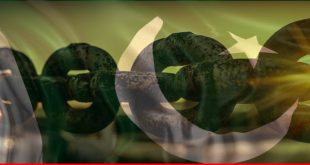It’s worth trying to determine Pakistan’s development stage in terms of Rostow’s five stages of economic growth that is: traditional society, preconditions or preparatory stage, take-off stage, drive to maturity, and mass consumption. The trouble is with Rostow’s failure to take into account government policies and economic reversals resulting from mismanagement and administrative corruptions. For example, the preparatory stage decrees development of certain economic and social infrastructure like ports, railways, airlines, power generation, educational institutions etc. While the suggested infrastructure in our case is very much in existence and evidence, the damaged state in which it currently is raises doubts about the comprehensiveness of Rostow’s treatise. So our economic identity would seem lost somewhere between the second and the third stage or more pragmatically, between the third and the fourth stage.
Our media got tremendous boost in the rule of a “dictator” whose economic and political achievements were, ironically, belittled by the same media within no time. The question pops up: were the media given freedom that was not commensurate with the level of economic and intellectual development of the country and its people? Did we possess resources to train an array of literate and semi-literate youth that took seats in the frontline programs of sixty or so channels unleashed on the people of a nation with a dismal literacy rate of 60%?
Excessive media freedom that is not in line with the economic development level of a country is more damaging than beneficial to the society. There are sure some pleasant surprises like unearthing of administrative corruptions, real and concocted stories of police excesses and scandals involving political bigwigs, but the scenario soon starts smacking of a mix-up among judiciary, executive and media; everyone doing the job of everyone else! Orchestral disharmony and reactive dissonance are to be seen everywhere.
Dennis Mcquail’s book Mass Communication Theory lists five basic functions of media: information, correlation, continuity, entertainment, and mobilization. Mobilization includes ‘campaigning for social objectives in the sphere of politics, war, economic development, work and sometimes religion.’ James Watson, in his book Media Communication, elaborates on the function of mobilization in the following words: ‘Mobilization of public opinion in support of a cause is at its most dramatic in times of conflict when the overriding principle of performance as far as the media are concerned is to be absolutely clear which side ‘we’ are on. Again this position comes under the heading of representing order. Media that attempt to give fair coverage to the enemy’s point of view are soon accused of being unpatriotic.’
We have seen a number of times that whenever issues like awarding MFN status to India are raised, the mud-slinging campaigns start across the print and electronic media with those favoring the award getting consigned to the unpatriotic trash bins. Reactive dissonance thus created by the media tends to divide the entire nation. In creating reactive dissonance, media sometimes blatantly crosses the line of logic putting the entire nation in a state of mental agony. The problem is that after committing such follies, media never feels the responsibility of relieving the masses of their mental agony by either changing their stance on the issue or by giving foolproof evidence of the correctness of their point of view.
One example is the Kargil War. While India had put everything on stake to malign Pakistan and the mastermind General, our media unashamedly joined hands with India simply because they were already running a campaign to discredit the General on political grounds. So it was for the first time – and perhaps the last time – in the history that India and Pakistan had a common objective as well as a common foe. It was not that Pakistan’s policy on Kashmir had undergone any change. The attack on Kargil, as admitted later by many military strategists, was a state-of-the-art venture. Our print and electronic media never took note of a column written by the offshore representative of Pakistan’s mostly read Urdu newspaper. The columnist talked about the overnight supply by a world power to India of the most sophisticated equipment that turned the Kargil position upside down resulting in heavy Pakistani casualties. The media should have gone into investigative mode and either proved the columnist wrong or showed their sense of guilt to the people and the General.
 PAGE Blog Business Weekly Magazine
PAGE Blog Business Weekly Magazine

